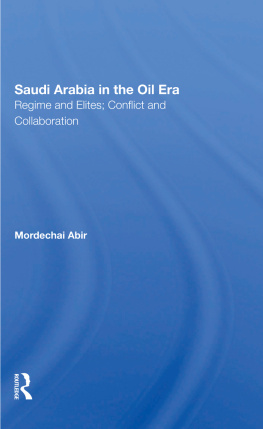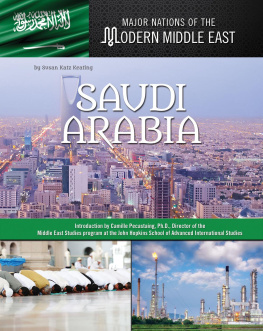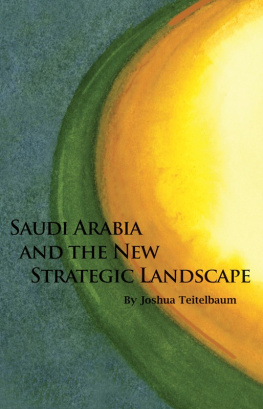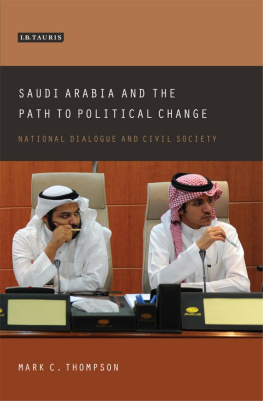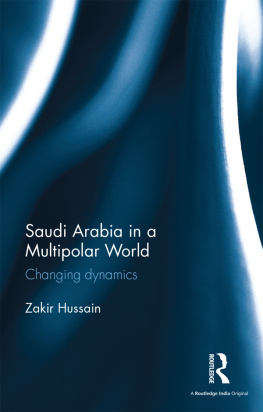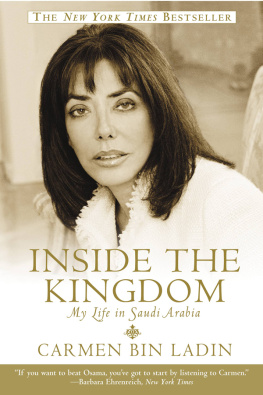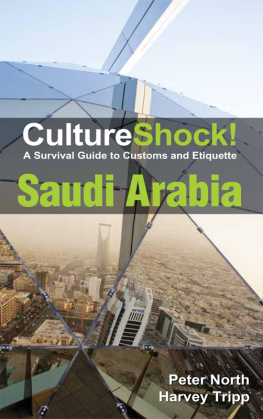First published 1988 by Westview Press
Published 2019 by Routledge
52 Vanderbilt Avenue, New York, NY 10017
2 Park Square, Milton Park, Abingdon, Oxon OX14 4RN
Routledge is an imprint of the Taylor & Francis Group, an informa business
Copyright by 1988 in London, England by Mordechai
All rights reserved. No part of this book may be reprinted or reproduced or utilised in any form or by any electronic, mechanical, or other means, now known or hereafter invented, including photocopying and recording, or in any information storage or retrieval system, without permission in writing from the publishers.
Notice:
Product or corporate names may be trademarks or registered trademarks, and are used only for identification and explanation without intent to infringe.
ISBN 13: 978-0-367-28658-3 (hbk)
When I began a survey of source material for this book in the early 1980s, I was somewhat surprised by the paucity of sources relating to socio-political dynamics in modern Saudi Arabia both in European languages and Arabic. Thus, William Rugh's article 'Emergence of a New Middle Class in Saudi Arabia' (1973), for instance, remains a classic to this day. In the field of social anthropology I found only a handful of serious studies of the Saudi population produced by western and Arab scholars (Katakura, Lancaster, Cole, Shamekh, and Hamzah's outdated work). Other sources in Arabic largely dealt with the kingdom's geography and tribal division, past history to the twentieth century, the reign of Abd al-Aziz ibn Saud, and the rise of the Wahhabi movement and its impact on the Arabian Peninsula. The contribution of Saudi scholars of good standing to the subject was minimal, as the Saudi modern elites were beginning to emerge in the middle of the century and only lately have they begun to publish worthwhile scholarly studies of their society and government studies inhibited, unfortunately, by the character of the regime and its strict censorship laws.
It was not only that Saudi Arabia was a sparsely populated desert periphery of the Arab world, but travelling in the kingdom until the 1960s or early 1970s was technically difficult and the authorities, as well as the xenophobic Wahhabi-Saudis, were suspicious of foreigners (Hijaz is the exception) travelling in their country or researching its population. Indeed, with very few exceptions, foreigners were not permitted to conduct fieldwork in the rural areas (Lancaster's and Cole's experience) and until the 1970s were not supposed even to travel in the kingdom other than between its main towns and in the Eastern Province, where Aramco began to operate on a large scale after World War II (and became a major source of information on Saudi Arabia as well as of oil). The provincial governors (amirs) are, inter alia, in charge of security in their respective areas and it is their duty to prevent unauthorised foreigners from entering them. Thus, Saudi Arabia remained until recently terra incognita .
Many books, articles and news items dealing with the Saudi kingdom were published in different languages after the 1973-74 oil crisis. In most cases they relate to the Saudi royal family and government, to power politics and defence, and to oil and the Organisation of Petroleum Exporting Countries (OPEC). Very few serious studies of the Saudi society and institutions and the revolutionary changes which they have undergone in the last twenty-five years, were published even in the 1970s, although their number has grown in recent years.
I myself faced the dilemma common to all Israeli social-historians dealing with Arab countries, that of being unable to conduct fieldwork in the countries which they research. The situation was exacerbated by lack of suitable published material and by limited opportunities to exchange ideas and opinions with Saudi counterparts.
Having exhausted all the available published sources I turned to press and radio monitoring collections. I also examined about 120 theses in the humanities and social sciences relating to Saudi Arabia, the majority of which were written by Saudis, and submitted to American, and in some cases to European, universities. A large number of the theses that I have read were of little relevance to me. The 35 or so theses which appear in my bibliography are not necessarily the best, but rather the ones I found of special interest or cited. A few were written by offspring of the Saudi oligarchy, some by students who became cabinet ministers, some by high-ranking officials. Nearly all, when it came to matters relating to the Saudi regime or the royal family, I found biased or, in many cases, relying heavily on foreign sources and previous PhDs (preferably ones written by ministers and senior technocrats), in order to avoid expressing an opinion and offending the rulers. Each thesis which I used, nevertheless, contributed to my understanding of different aspects of modern Saudi Arabia. Only a few of the theses represented, directly or indirectly, the point of view of the militant nationalist opposition to the regime which, it seems, is not uncommon among Saudi students in western universities. These few theses were essential for understanding the phenomenon of a miniscule militant opposition in the kingdom on the one hand and the rapidly growing new middle-class elites which serve the regime, yet do not participate in decision-making, on the other.

